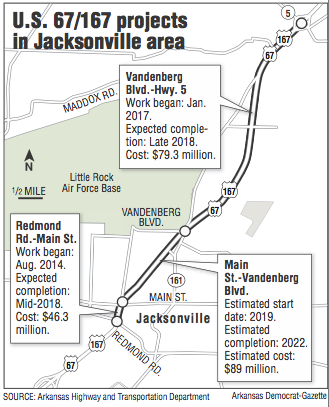The Arkansas Highway and Transportation Department saved the worst for last in widening a section of U.S. 67/167 from south of Jacksonville to Cabot.
Two of the three projects needed to widen the 8.3-mile section are to be completed next year. They are located on either end of the corridor.
The third project is on a 2.25-mile section that goes through Jacksonville. Given the estimated amount of right of way needed -- an almost unheard of $22 million -- over parts of the city of nearly 29,000, it will cost nearly $10 million per mile.
The potential cost would cover 145 parcels totaling 12 acres. The total amount includes acquiring the rights of way as well as the costs to relocate businesses and residences.
The department spent less than $40 million all of last year on acquiring rights of way for its projects, said Perry Johnston, who heads the agency's right of way division.
"I can't remember a cost that high per mile," he said.
The estimate came from Garver LLC, the engineering firm the department retained to manage the construction of the projects under the agency's $1.8 billion Connecting Arkansas Program. The project is part of the program, which is financed in part by a half-percent statewide sales tax in place for 10 years. Voters approved the initiative in 2012.
The project, if its latest design becomes final, will take out part of the backyards of several homes on Hospital Drive on the east side of the highway, including the backyard of the house that Sherrie and Steve Ivy have called home for 14 years.
Sherrie Ivy was among 140 people who attended a public meeting last week to view the latest plan for the project.
"I hate the traffic congestion and everything," she said. "It needs to be done, but it's going to eat into my yard."
The project also is going to eat into the parking spaces of several businesses lining both sides of the highway and require the relocation of several businesses, including a donut shop and an animal clinic.
Johnston and a team from his division were on hand to let people whose property is affected by the project know what to expect once the selected alternative is identified.
"The department is not in the business of putting businesses out of business," said Danny Straessle, a department spokesman. "Development in this stretch is very dense. It is right up on the frontage roads, on the freeway. Our only choice is property acquisition."
But as dense as it is, the need for adding one lane in each direction to the two already there is evident. Up to 75,000 vehicles a day pass through the area.
"I can stand at my kitchen window and watch the traffic stop and go every day," said Sherrie Ivy, a nurse who commutes between Jacksonville and Little Rock daily. "When there's an accident, it just stops."
The project won't just widen the highway between Main Street and Vandenberg Boulevard, it will upgrade the interchanges at James Street and Vandenberg with other improvements and make the frontage roads one way, using two Texas turnarounds at each end of the project to make it easier for motorists to access businesses on the opposite side of the freeway.
Vandenberg serves as the main entrance to the nearby Little Rock Air Force Base.
"I like what I see," said Wayne Marcotte, who moved to Jacksonville in 1965. "I just hope I live to see it."
It is scheduled to begin construction in 2019 and be completed by 2022 at an estimated cost of $89 million.
Sherrie Ivy is bracing for the continued construction, which has been ongoing in the area since 2014.
"As long as I've been driving on it, some part of 67 has been under construction," she said.
Jacksonville Mayor Gary Fletcher preached patience.
"This is really going to be an inconvenience," Fletcher said. "And that's a mild word. But it's a temporary inconvenience for a long-term benefit."
Fletcher used to be in construction and said he hated remodeling projects because "people always griped about the mess it created.
"I said you have to look past the mess and see the benefit you're going to have here in six months or a year. You'll forget the inconvenience when you get the benefit. But it's going to be hard."
Metro on 05/30/2017

